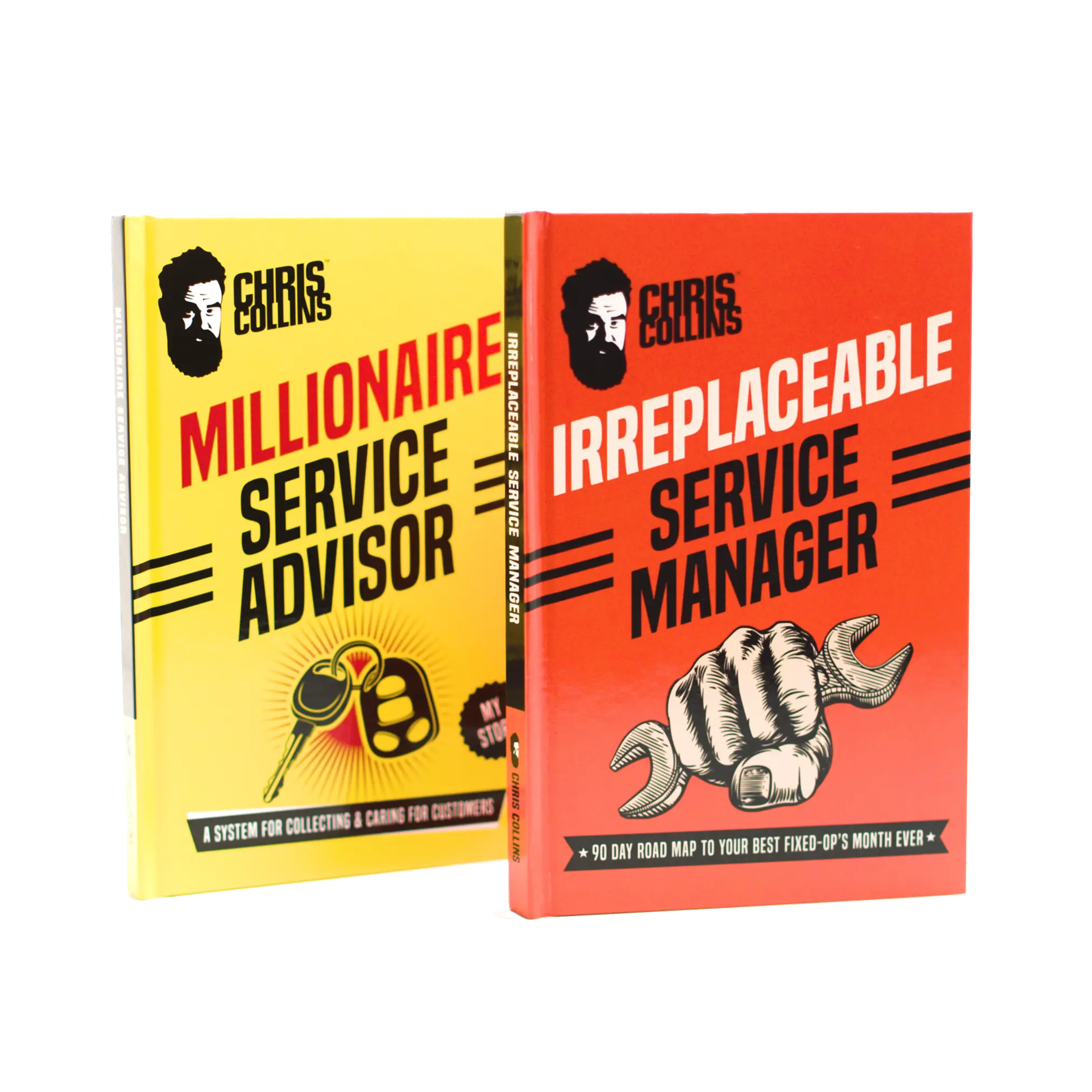
HERE’S WHAT YOU NEED TO KNOW ABOUT FIXED OPS CONSULTANTS
Operating your business for more than ten years will definitely require Fixed Operations Consultant (also Fixed Ops Consultant), who will help improve the process and
This may come as a shock to you, but I occasionally make mistakes. Everyone does, but what’s important is learning from them. When I was a 19 year-old service advisor, I made one of the biggest mistakes of my career – one so bad that it made a customer hate me – but I felt so bad that I made sure it never happened again…
Today, we’re going to talk about the top five things service advisors take for granted, one of which led to that infamous mistake I made when I was a kid. It’s a good list and I’m willing to bet you’re going to learn a couple things. And to all the Managers out there reading this– see if you recognize anything from your own service advisors on this list.
It would probably be a good idea to make your service advisors watch this one.
How important is service history on a car? When I was a service advisor, it was my go-to before I even went out to meet the customer.
This is the one that can undo a sale really quickly. Let’s say you have a good customer that comes in, but you’re busy so that puts you in a rush. All of a sudden, the technician gives you the list and it says the car needs front brakes, rear brakes, etc. Then, you call up the customer and you lead with the first thing which is the brakes, but then they say, “Whoa, hold on a second there. Didn’t you guys just do my brake six months ago?” Now, what could you have done that would have prevented you from ending up in that tough spot?
That’s why you check service history, and it’s also why it’s important to build a loyal clientele so you can keep track of their histories in the first place. And if they got serviced at some other place before you, ask them something like, “Do you mind if I call over there and ask them what they had done so we don’t overlap?”
Oddly enough, other places aren’t that helpful but at least the gesture is nice…
This one’s sad. A thing with human behavior is that it’s really easy to take relationships for granted, one of which is that first timer who doesn’t need much beyond an oil change. When I was a service advisor, I always thought I’d make my money by taking care of them so they wouldn’t need anything early on, but I still make friends with them so I become their go-to-guy when they do end up having a problem.
I remember watching other service advisors trip over each other to get to the old van or bus because they knew that it was $2,000 to fix the leaky coolant hoses or whatever, but nobody wanted to write up the brand new Subaru. But that wasn’t the way I looked at it. I would think in a couple years, they’re still going to need maintenance, right?
Something I’ve heard a lot on strategy sessions that I’ve done lately is pay plans for advisors where they bonus them on hours per RO. I don’t understand why anybody would do that because the thing that happens is that they avoid going out and writing the smaller jobs like oil changes. Do you believe that pay plans direct behavior? If so, then by having an hours per RO bonus in your pay plan, your advisors are going to avoid the newer customers that need small, routine maintenance jobs!
At that point, you’re no longer building a business that’s customer-centric, and instead you’re focusing on what the business can extract out of the customer.
You’re wasting your tech’s time if you’re not giving good descriptions on the repair order. You’re not going for a test drive with the customer and actually putting your hands on the noise or the rattle. It’s just, “Customer says it rattles.”
Every minute of a technician’s time should be generating revenue, so if the service advisor isn’t identifying the root cause of the problem on the repair order, or they don’t do a good write up, they’re adding minutes to the tech’s day that aren’t spent generating that revenue.
Not only that, but technicians are compensated on just one thing– their time. They don’t make anything on part sales, so if you waste their time, you’re not only hurting the potential revenue of the business, you’re robbing them, too.
Same with diagnostics. You gotta give them enough time. Vehicles are rarely fixed in under an hour or for less than $500.
A lot of times, service advisors take prevention for granted and they overlook it. I’ve heard a common misconception that it’s greedy to prescribe preventative maintenance, which couldn’t be further from the truth. Preventative maintenance is proven to save a customer money. I think the general consensus is that every $100 spent on preventative maintenance saves you about $1,000 in future breakdowns.
That’s an 10-to-1 return on investment!
The common belief that preventative maintenance is the same as an unnecessary upsell isn’t only wrong, it’s dangerous. Your job is not to sell maintenance or upsell unnecessary maintenance– your job is just to keep the customer in a reliable vehicle, and sometimes that requires preventative maintenance.
As a service advisor, I learned this from a mistake early on in my career. This customer came in with a coolant hose leaking. We replaced the hose and he took the car, but then we got a voicemail from him over the weekend and he was MAD!
I called him back on Monday, and he hated me. He was so mad, and rightfully so. Both of the hoses were the same age, right? So even if only one of them is leaking at the time, we should probably have just replaced both, shouldn’t we? Isn’t it worth the extra charge to prevent a future breakdown or accident?
The answer is clearly yes, because his wife was driving from Seattle to Spokane with their kids and the car broke down! We didn’t do our due diligence, and his wife and kids got stuck on the side of the highway on a weekend when we were closed! Not good. Prevention comes in many forms, and as a service advisor, you have to really think long and hard about preventative maintenance.
One thing I think is crazy is that a lot of manufacturers now kind of have this mentality that at 100,000 miles, cars are disposable so they don’t recommend things like power steering fluid. So when the cars reach 70-80,000 miles and the power steering racks start going, there’s literally chunks of metal in there when you drain them!
Just think about it psychologically: Manufacturers call the coolant ‘lifetime,’ when they actually mean ‘once it hits 100,000 miles, just push the thing off a cliff or put it in the smasher… anything but replacing the coolant.”The manufacturers want the customers to perceive that they don’t have to maintain the cars, because their goal is to sell new cars! But your job as the service advisor is to protect the customer from that sort of thing and keep them in a safe and reliable vehicle. It’s nuts to even debate that, but because so many service advisors oversell and over-recommended, preventative maintenance gets a bad reputation.
If you just think about preventative maintenance as a whole, and you pay attention to what’s happening in the car, and the Manufacturers’ bad policies (like the connection between power steering and the factory replacing so many racks), you’ll end up avoiding surprises and problems for your customers down the road.
That’s why I always say: if you wouldn’t sell it to your mom, don’t sell it. I told my mom to replace her power steering fluid because I would rather her pay for that than spend two grand on a rack in the future.
I’ll tell you, after a couple incidents like that guy, I never skimped on doing an inspection on a car and telling the customer what was wrong. I’d rather have you be mad at me because you think I’m overselling and charging you more money, than have you stuck on the side of the road because I didn’t tell you what I knew. I’d rather have a technician rerack a car and inspect it, than have a customer leave and not know.
When I was a service advisor, even selling a little bit, I was able to pay the rent with my numbers, and I even got a piece of what I did. No liability; I didn’t have to stay up at night worrying about making payroll or anything like that. I always looked at it as my business, and that business was collecting customers. The more friends I had and the more people I could collect, the better I did. I wasn’t consciously creating key throwers, but after a while, I realized just how busy I was. I remember at one point looking around and the other seven advisors were standing around while three customers were waiting specifically for me.
I’ve seen over the years that people want certain special advisors that have been in our system, and they wouldn’t let anybody else help. I remember sometimes I would get like a Thursday off early and then the rest of the weekend off while my band would tour, and I would come back from one of those and all the advisors were in a little huddle. I’m like, “What’s up?” and they’re like, “We hate it when you’re gone. Your customers just pull in, and when they find out you’re not here, they leave!”
That’s what you want, right? They don’t trust anybody else but me. If I tell them they need something done, there’s no reason they’re not going to believe me because my intentions radiate. You can tell if somebody’s authentic or not, and there’s absolutely nothing inauthentic that I would have had them do.
Another thing is if you take pride in your job and stop looking at it like you’re just making X number of dollars per hour, you’re not just bleeding the clock. You’re more productive and your behavior changes. Your quality of life improves.
So recap the top five things service advisors take for granted: 1. Service History, 2. The Relationship, 3. Technician’s Time, 4. Prevention, 5. Business Within A Business. Those are the five things service advisors take for granted, and with that, we can move onto our questions for this week:
“I love what I do, but not a fan of the pay plan. It’s all averages. I noticed some advisors avoiding customers at the end of the month because they’ve already hit their good averages. I actually love helping customers, but at the end of the day, a simple oil change hurts my averages. Any advice?”
So I can’t tell if this is communism or averages because I run into that sometimes where they average all the advisors’ numbers together. But this looks more like you’re getting paid off of averages so your pay plan is hurt if there’s no potential to upsell.
Here’s the thing that I learned about pay plans from being a service advisor because I accidentally accepted a job once where I didn’t understand. They showed me the pay plan, I looked at the percentage, I did the math and I was like, “Oh, this is a nice raise.” I took the job and then I went to get my first paycheck and the advisor in front of me that never got up to help a customer or anything says something to the effect of, “I hope you never quit because you made me a lot of money,” and I was like what does that mean?
That made absolutely no sense. What ended up happening was that they didn’t want to lose me to make the other guy happy so they changed my pay plan. Performance drives your influence so, if you’re putting up the numbers, then they’re not going to want you to go away and your pay plans end up becoming negotiable. Let your numbers talk.
Get in coaching and fix your advisor pay plan because what you got sounds terrible. It sounds like a pay plan from 1984.
“I’m in Europe and I just finished high school as a technician, but I’m more interested in becoming a service advisor. My father owns a shop. He’s a mechanic and he wants me to keep building our company. Should I go to college for a more technician-related degree or management? I would benefit from either choice, but I would love to hear your opinion. What would you do?”
I’m not the right person to ask this question, but Jeremy gives a good little nugget of advice which is to move to LA and get a coach. Don’t even go to college. You’re going to spend less money here to learn more through our coaching program, and then you can go back to Europe in 18 months and you’ll be slaying the dragon. I meant that metaphorically, but it’s been a weird year so I don’t know what’s been going on in Europe lately.
I think if you really wanted to, you could learn more about that job through our program than you ever could in school. I’m not big on two or four years, I’d rather work. Personally, I’d get to work and read books. When I was single, I dated this psychologist and she said that I know more about psychology than she would ever know, and I never went to college but I’ve read well over a thousand books. One year, I spent over half a million dollars on my own personal development.
I don’t know, I feel weird saying that because some people need college. They need structure and motivation so it’s hard for me to say without knowing somebody. Jeremy has his concept of a passion bucket where good service advisors never run out of energy if their bucket is full, but I grew up poor and hungry. A lot of the things I did, I had no passion for, and I did them because I was hungry and they had to be done. The hunger gave me that drive, I didn’t need passion.
I’ll tell you this, too: I’ve never met a really good entrepreneur business owner that attributes their success to a degree in business. Never. It’s never happened. In fact, I meet people with degrees in business that need my help desperately because they’re doing it wrong. They don’t understand, and you can’t learn that stuff in a classroom or in a textbook.
“I have a question for you guys. This pertains to both advisors and service managers. What do you do and how do you handle a vehicle that comes into the shop under factory warranty with a drivability concern, your master technician finds himself unable to track the source of the issue after multiple attempts, he’s followed technical assistants who are often slow in response and vague, the customer is restless, and there’s seemingly no end in sight? I feel like both positions at different times in the process. Both are bound to find themselves dealing with this issue. Assume also the customer is a good customer. He’s been spending money and building trust in your drive for several years.”
So, he should have never put it in the shop without verifying it. I think I’ve explained this on the show before. The thing I would say to a customer is, “Listen, there’s a five-mile dome over the shop and whenever you come within five miles, your squeak, your rattle, your run ability problem doesn’t happen so we need to verify it.” So I just set that up with the customer because if something happens with them, it doesn’t mean it’ll happen within the invisible dome around the shop. Then I go, “When does it happen? Cold, hot, going over a bridge, in a rainstorm, first thing in the morning, or when you pull in and park and then run back out to get it?”
Then, I get permission from the customer so I can make the technician drive the car home like, “We can’t verify it, but can I have him drive it home a couple times because it happens first thing in the morning?” or something like that.
So those are my tricks, but I wouldn’t have put it in the shop without verifying it. And listen, you probably can’t verify it, but it changes the customer’s perception. If they can’t show it to you and make it happen, then they can understand how difficult it is for a tech to find it.
When I was an advisor, we didn’t have cell phones, but now you can ask customers to pull out their smartphone and record a video whenever it happens. That’s the only proof you can get outside of the five-mile dome, and that would really help us.
As always, thanks for tuning it. We had a great show this week and we’ll see you next time on Service Drive Revolution!

Operating your business for more than ten years will definitely require Fixed Operations Consultant (also Fixed Ops Consultant), who will help improve the process and

Automotive consultants are employed by dealerships and other car companies to help in developing their businesses and, in turn, increase profits. They also might work

“I FIND TELEVISION TO BE VERY EDUCATING. EVERY TIME SOMEBODY TURNS ON THE SET, I GO IN THE OTHER ROOM AND READ A BOOK.” -GROUCHO MARX

Service Managers Twenty (20) Group is a regular mastermind meeting held every other month intended for Auto Dealership Service Managers where experiences in different automotive

Operating your business for more than ten years will definitely require Fixed Operations Consultant (also Fixed Ops Consultant), who will help improve the process and

Automotive consultants are employed by dealerships and other car companies to help in developing their businesses and, in turn, increase profits. They also might work

“I FIND TELEVISION TO BE VERY EDUCATING. EVERY TIME SOMEBODY TURNS ON THE SET, I GO IN THE OTHER ROOM AND READ A BOOK.” -GROUCHO MARX
LINKS

This Step By Step Guide Will Teach You How To…

